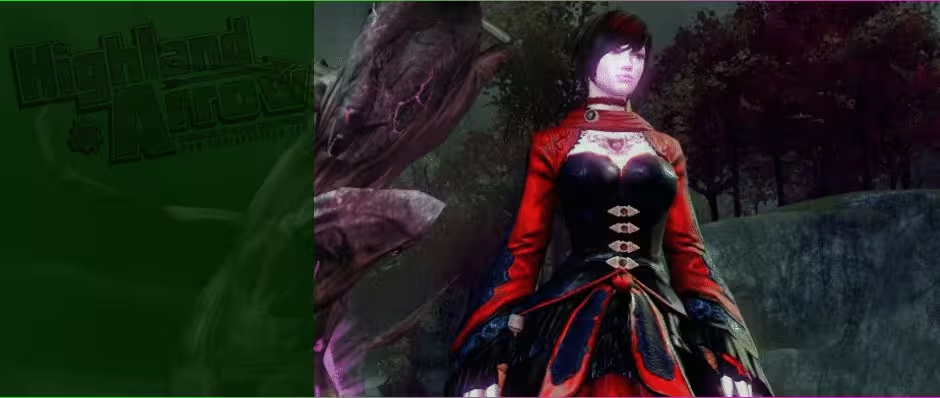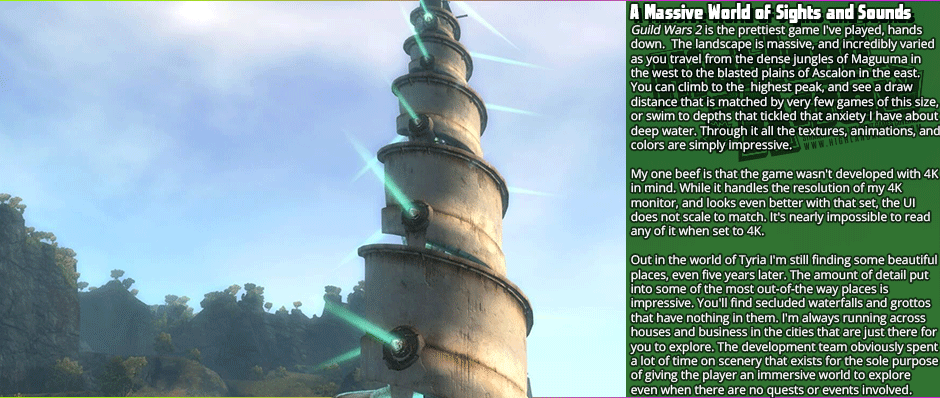


Guild Wars 2
Platforms: PC
Reviewed on: PC
Reviewer: Trever Bierschbach
Review Play-Time: 1019h
Developer: Arena.net
Publisher: NCSoft
Released: 2012-08-28
Review Published: 2017-03-13
Review Updated: 2021-02-12
+ Massive world with deep lore incorporated throughout
+ Beautiful graphics and unique score
+ Easy to learn without a noticeable tutorial
+ Vast array of ways to play depending on tastes
-The amount of things to do can be overwhelming for
new players
- The main story can be predictable
- Newer 4k resolution is available, but UI does not scale
to match

Guild Wars 2 is an MMORPG with both a free-to-play element (as of August 2015), and a one-time purchase subscription-free format, developed by Arena, Net and published by NCSoft. The game is a combination of a persistent world, where all players can interact with each other, and player instances which can be played solo or as a party. The events of Guild Wars 2 and the Heart of Thorns expansion take place in Tyria about 250 years after the events of the original installment in the series. Tyria is a custom world that mixes custom races, magic, dragons, monsters, and a budding technological boom to create a world different from what is commonly seen in other fantasy RPGs.
One might wonder, why a review on a five year old game? I've recently gotten back into Guild Wars 2 after a long break playing other games. I found that I'm having just as much, if not more fun than I had when it was first released. For me that's a rarity. Often if I put a game down for that long the loss of interest is more evident when I return. That, coupled with just how much content that's been put in the game since release, make this a game I think most MMO fans will enjoy. It's also a game that can be picked up, even now, without feeling like you missed out from preious years, or have to play catch-up.
Since release in 2012 the game has seen 3 major content releases in the form of living story updates, and one full expansion with the release of Heart of Thorns in the fall of 2015. Living stories are a series of world-spanning events and upon completion the world is changed for all players. The end of Season 1 saw the destruction of the game’s core city, Lion’s Arch, which wasn’t rebuilt until months later. The completion of the Living Story season 2, Seeds of Truth, leads right into the events of the Heart of Thorns expansion and the opening up of more of the Maguuma Jungle in western Tyria. Currently season 3 is available and it all shows the developer is keeping their promise in constantly release new content, and even now there are hints that a new expansion may be announced in the near future.
Play However You Want
The amount of content in this game is staggering, and the ability to do any, or all of those things at any stage of the game is unprecedented compared to other MMOs. The core goal of Guild Wars 2 gameplay is to put fun above the grind. Grind is something all RPGs have, to one extent or another, but GW2 developers have gone to serious effort to make it less of a factor. One thing they did to eliminate this is the pacing of leveling and gear acquisition. While in a lot of RPGs and MMOs you will eventually get to a point where you have to just run around killing monsters for hours to gather funds, gear, and experience before you can move on, that’s not so with this game. If you play through each area, do the events and quests, and follow the personal story, you’ll rarely find yourself needing to grind experience or gear. Each area has quests, and the quest grants a currency called karma. Each quest also has a vendor who sells gear equivalent to the area level and sold for less karma than the quest award gives. There are more than enough areas in the various level brackets that you can actually max your character without exploring every map, or killing monsters just for experience at any point. It also means your gear will be level appropriate for the zone. The only time you’ll find yourself grinding is when you want to start crafting the higher tier gear, or acquire the more rare items, none of which are needed to play the game itself. It’s entirely up to you, if you want to play the game more casually you’ll still have a great time and won’t find many doors closed to you.
Along with accessibility for newer or lower level characters, the game does a great job of allowing higher level characters to team up with low levels without them completely overpowering everything. While gear won't change, level and stats adjust to the area you're in, so your level 80 can play in a level 10 zone with your friends, and you'll be scaled down to match. You'll still have a distinct advantage, but it won't feel like you're just carrying them along for the ride. This helps eliminate the issue most MMOs have when new players try to join friends who've had the game for awhile, or when people start playing the game in general. The feeling like you have to play catch-up just so you can play with your friends is somewhat reduced. Higher levels don't feel like it's such a chore to go help either.
Guild Wars 2, like its predecessor, keeps the PvP element optional. The exploratory areas of the game are completely player versus environment (PvE). There's no fighting over loot, resources, or getting ganked by trolls while playing. Each loot drop is specific to the player, and every resource node can be gathered by everyone. This helps create a more cooperative environment, and lets people who don't want to participate in PvP completely avoid it. PvP is also separate in that when you join it your character's level is increased to max, you have a separate PvP build, and stats. It means you can ignore PvE completely if you want, and focus exclusively on PvP. It let's you play whatever part of the game you're interested in playing, and ignore any parts you want to avoid.
The third major option for players is World Vs. World. In WvW players join others in a massive battle against two other servers. The war spans four maps dotted with fortresses, keeps, outposts, and camps. It's sort of a giant game of capture the flag with siege engines, monsters, golems, and giant armies striving to claim territory. You can run alone as a scout, relaying troop movements to the team commander. If you prefer defense you can hold a keep wall against assaulting troops and their siege weapons, or man your own trebuchet and launch boulders into the attacking horde.
All of these play styles have their own achievements and rewards. And if you are the type of person that likes collecting achievements, good Gods does Guild Wars 2 have a lot of achievements. Daily, exploration, jumping puzzles, collections, and PvP are just a few of the many categories of a staggering number of them. If you're a completionist like me you'll find endless things to do hunting down each and every one of them. You can play this game for hours every day, and do something different every day of the week.

Sound is another area where this game excels at; primarily in the sound track. Voice acting is very good for the main characters of the story, but fairly standard throughout. The sound effects don't really stand out among other MMOs and RPGs either. They're all good, but so are a lot of other games in the category.
The score, however, is where Guild Wars 2 shines among other MMOs and RPGs. It's no surprise here since Jeremy and Julian Soule are the composers for most of the music. His other credits include Neverwinter Nights, Harry Potter, and Dungeon Siege, and he has won multiple awards for music. With GW2 we get a lot of new music, but also tracks that are improved versions of, or reminiscent of the more memorable tracks from the original game. The soundtrack creates an epic feel for an already massive world.
The Way it's Played
Gameplay mechanics are very different for those of us who played the original Guild Wars. At first I missed the way skills had been done, and the way each class could be customized. The more I played the second the less it mattered, and today I can barely remember how the original was set up. Gone are the elaborate skill trees and dual classes. Gone too are the dedicated healers, sort of. Death is no longer such a hassel, and travel is much more friendly to new or more casual players. An entirely instanced world has been traded for a persistent one (with a few personal/party instances), and quests, missions, and events are much more individual and group friendly.
Up front players will notice that skills are much more simplified. To someone new to the franchise this won't be a shock, except that it's different than most other MMOs. On your left you have your weapon skills; three for main hand and two for off. On the right are your utility skills; one healing, three general, and one elite skill. The slots open up and new skills are gained as your character levels. You even have skills while downed which allows you to defend yourself until help can arrive and get you back in the fight.
For the weapon skills, they are based on the weapon your character wields, and each class has several options. You may be a guardian with a mace and shield, elementalist with a staff, or a thief rocking dual flintlocks. Some weapons are two-handed, giving all your weapon skills to that weapon alone. Once you hit a certain level you can set a second weapon to switch to, giving you up to 10 weapon skills at any time. This can make switching from ranged to melee, or offensive to defensive quick and easy. It also allows you to switch if you find yourself needing to keep the pressure on but your weapon skills are all refreshing for your main weapon.
The utility skills can be switched on the fly while not in combat. Across one map you can face a variety of opponents and may need to switch up one skill for another to make things go faster. Unlike GW1 every character can heal, and many of the healing skills are personal. Everyone remembers how hard it was to find a dedicated monk in GW1 since most were off trying to solo everything with their 55 invincible build. I have no idea how many times I stood around for more than an hour trying to get a party together only to have some other party snatch up the one dedicated monk healer. Those days are gone, and it makes party formation so much faster.
Then there's underwater combat, and an entirely different set of skills and weapons. Before the Heart of Thorns expansion, the truest sense of elevation in the game was underwater. The maps are huge, but the maps with water in them often go so deep they scratch at that fear of heights and dark, bottomless water that many of us have. The size of the world becomes truly impressive when you factor in the underwater areas, and then the jungle maps of the recent expansion.
With all of this it may sound like the game is complicated and hard to learn, but that's definitely not the case. The learning curve is low, without a lengthy and boring tutorial like we see in a lot of these games. Learning the game is quick, and done in such a way that you don't feel like you're getting a tutorial. This helps with becoming immersed in the story and lore of the world quickly.
Quests, missions and events are handled almost seamlessly now. Early on the game had your standard flaw with fetch-it quests and a lot of running back and forth but that's been changed. When you take a quest, a renowned heart they're called, once completed you don't have to return to the quest giver to get your reward. With your personal story there's an even mix of backtracking and moving on. Sometimes you have to go back to speak to the person who sent you out and other times you are directed to talk to someone further down the story path. This design gives the game a sense of adventure and exploration rather than feeling like a network of paths radiating out of one central hub. The original did a great job of that as well, but GW2 pushes it further. There is real rewards for seeking out every nook and cranny of the world beyond just the motivation to see the design of it.
Your Story is Personal
Story in Guild Wars 2 is multi-faceted, and its quality is mixed. For an MMO the personal story is good, but overall relatively predictable. Where the writers did well is making the early parts of the story varied. Depending on your chosen race, and beginning attributes, there is a varied combination of story paths. Then you choose one of three factions to join, making that part of the story unique as well. You could theoretically play a dozen or more characters and not repeat the first part of the narrative. After awhile though, the paths come together and become the same. The world is threatened by a dragon, and you must band the races, and factions, together to fight it. Not so original, but it does have a good delivery.
The smaller stories, found in each area as events, missions, dungeons, and quests can be very interesting. You'll find yourself assisting farmers just trying to make a living, or a captain training his recruits. You'll save children from a witch in the woods and explore a crypt to help lay spirits to rest. Each area, town, city, and outpost has something going on. They have a connection to the main story, but also their own history and events. The writers have created a world that feels alive unlike any other game I've played myself.
The team of writers, professionals in fiction writing as well as game design, have done a great job of building the world of Tyria. The races have their flaws, prejudices, and virtues. The history and lore of the world is deep and interesting. You'll find books scattered around that you can read, monuments to ancient heroes to see, and ruins to explore. As much as the world feels alive, it also feels like it has a past that isn't just scenery.

